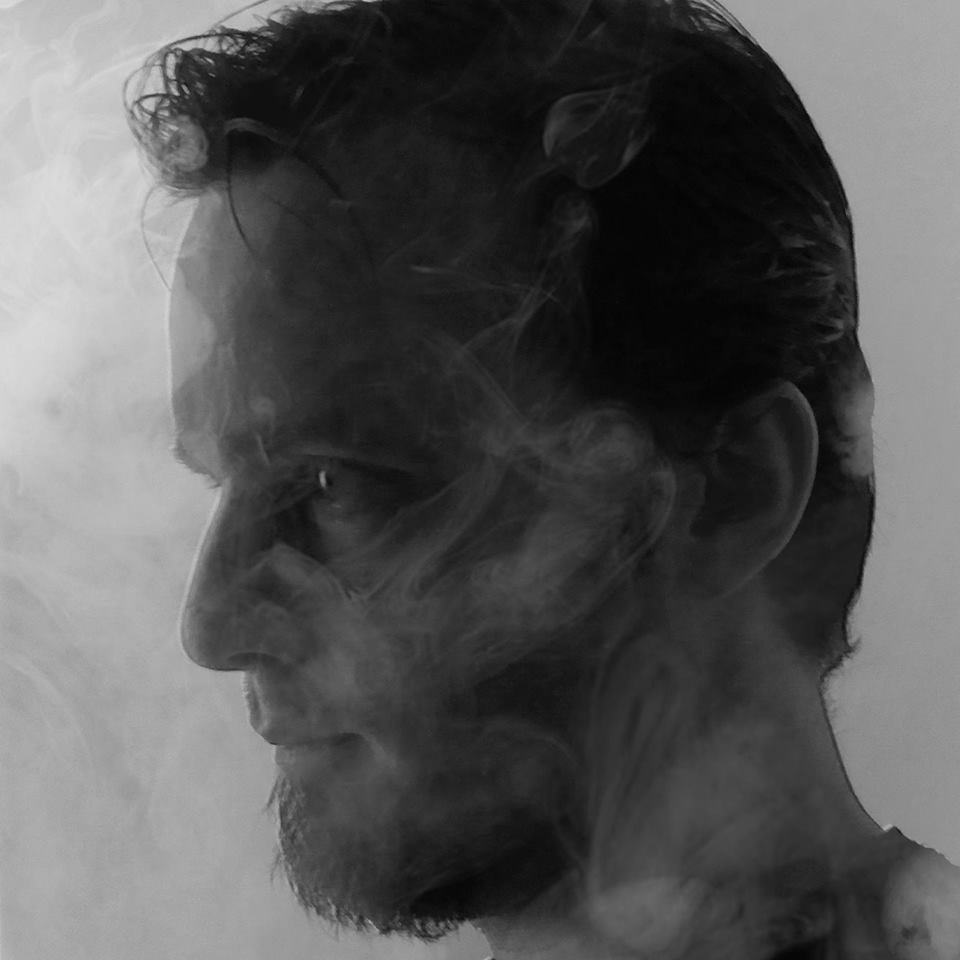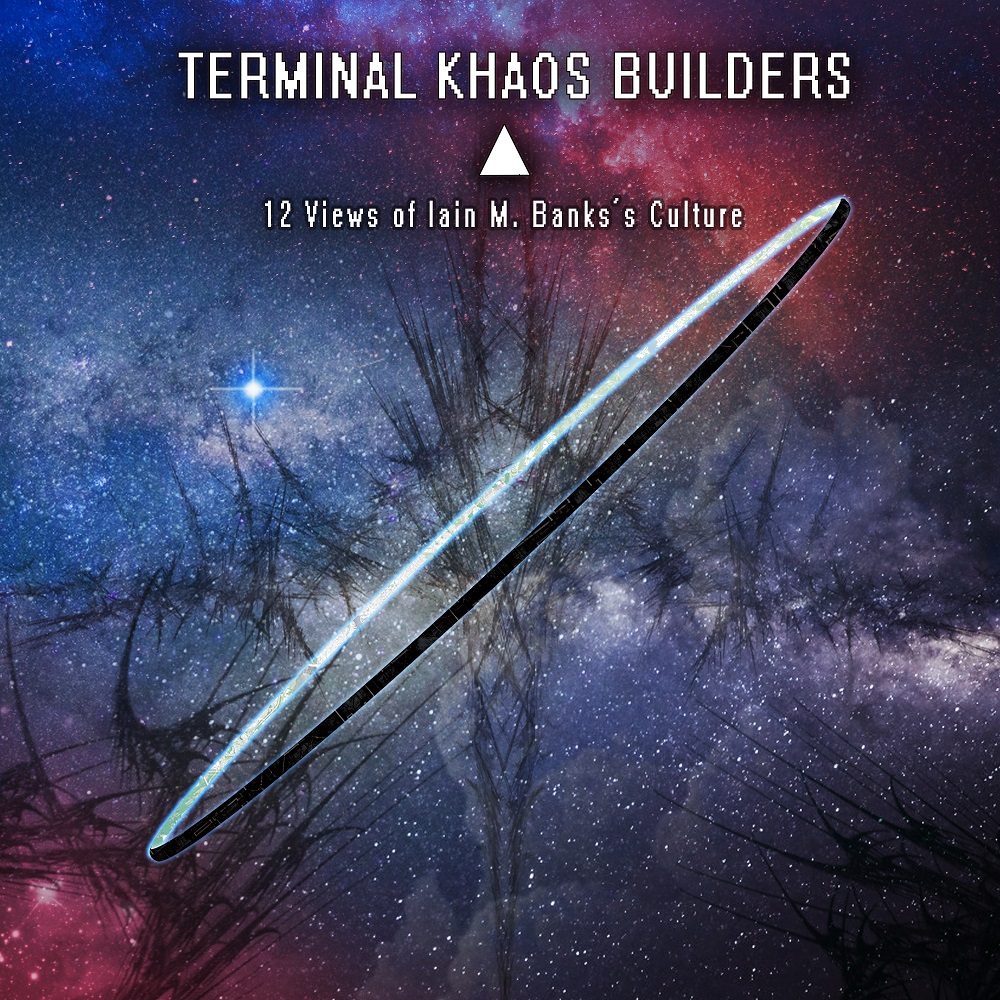Terminal Khaos Builders back with another futuristic electronic music album
Terminal Khaos Builders (TKB) is the musical side-project of Nicholas Muller. Based out of his native France, Muller is a guitarist by trade. When not performing in his heavy metal band, Helioss, Muller composes electronic music. Combining elements of synthwave, baroque classical and heavy metal, TKB fabricates a unique blend of electronic music.
Muller’s second full length album, 12 Views of Iain M. Banks’s Culture, builds upon his virgin effort, The Endless City. (Read the full interview from The Endless City) Layering washes of keyboard sounds, heavy drum and bass beats, and sinewy electric guitar melodies, 12 Views, shows an emerging Muller as a stand out in the synthwave genre.
The album is an obvisou homage to the great Scottish novelist Iain M. Banks, knowned for his incredible Culture Cycle. While, 12 Views is an instrumental album, the titles of the tracks are all selected and inspired by Banks’ works. Muller cites Banks’ writing as a major influence on his life as well.
Slickster: What does Iain M. Banks represent to you and how has his life’s work impacted yours?
TKB: Hello Chris! I’m a fan of science-fiction novels (Dan Simmons, Frank Herbert, Robinson, Hamilton, Stross, Egan, Liu Cixin and many more) but I’ve always considered Iain M. Banks, a Scottish novelist (sadly died in 2013), as a very special novelist. This is because of the recurrent themes he used in his Culture series. He depicted a very powerful post-humanoid civilization with sentient ships, highly educated citizens and perfectly developed technology: a true modern utopia where immortality is guaranteed and freedom is absolute.
This civilization, called “Culture”, lives (almost) peacefully among other more or less developed exotic races through a galaxy full of life. In those books, Banks offers a mix of adventures, humor, tragedy and a lot of ethical and political reflexions mostly based on the case where the Culture meets a less evolved civilization with bad ethical behaviors – like torturing its own people, corruption, violence, etc..
The remaining question is: what would an infinitely wise, rich and technologically advanced civilization do? What is good to do or not do, is it legitimate to get involved in their development, and how? Of course, this kind of thinking remains for the most part a problem for our modern times because it’s a complex ethical problem which cannot be solved with a simple answer. That’s why most of the protagonists of the books are connected to the “secret services” of the Culture, Contact and Special Circumstances whose missions are to deal with this kind of problems, even if it involved violence, death, murder or extortion as long as it is for the better good (even if, sometimes, mistakes are made). Like a dark face that the Culture masterminds – AI ships, agents and drones – use with both great caution and real amusement.
So with such unique and deep conducting lines, Banks has made a series of novels which could be considered as space opera, but with a real consistency, smart dialogues and a real sense of wonder. It’s obvious when you read any of this books that Banks wasn’t only trying to makes you travel through the stars, but to make you think – the Culture can easily be considered as an idealistic vision of the western modern way of life, atheist, libertarian, where liberty is total as long as it doesn’t interfere with someone else freedom, and where some benevolent ultra-intelligent AI takes all the decision for the better – which is questionable but allow a society where money is no more and where the only harm a citizen would suffer is the ones he choose to.
Really, there is a lot more to say about Banks’s vision, but it has deeply impacted me in my everyday life. It showed me that, with intelligent diplomacy, you may consider strangers as friends and how peace can be the most common option – the opposite of the Chinese Liu Cixin’s vision in The Dark Forest, where any unknown intelligence MUST be considered a danger and should be eradicated at all cost. I guess we can see in those two opposite visions a reflection of their own culture, in some ways…
Slickster: What’s up with the long and thought provoking titles of the tracks on Iain M. Banks?
TKB: All the title are quotes from the books. It was hard to choose because there a hundreds of beautiful words in the Culture series. Most of them are clear enough to talk to everyone when some of them should be included in the larger context of the books, like “But in the end, it’s still just cleaning a table” or “It was the Culture’s fault”.
Slickster: On “All you ever were was a little bit of the universe”, thinking to itself, there is an epic piano cadenza. Who composed and performed this?
TKB: Everything you hear on the record has been written by myself. Glad you appreciate this piano part! To be honest, I don’t know how to play piano. But nowadays, with technology, you can create the illusion of someone playing it. It requires some knowledge and a sense of musicality, but you can slightly change the tempo and the dynamic of each note to create something close to a natural playing. Of course, not being a pianist myself, I certainly did something far from perfect from a professional hearing, but with patience and dedication you may manage to reach what you want.
Slickster: Iain M. Banks, once again features, a lot of your heavy metal guitar playing. Can you walk us through your daily practice routine to keep your skills honed to a razor sharp edge.
TKB: I’ve been a guitar player for almost 20 years, mostly in the metal area – my other main band is symphonic black/death : Helioss (https://helioss.bandcamp.com/). I’m not really practicing anymore, I just enjoy myself playing, writing and recording some stuffs. I learned by myself throughout the years. As a teenager, we didn’t have the internet so learning alone with quite hard: now, you have tons of tutorials, tools and others helping stuff which makes you save time.
With “12 Views of Iain M. Banks’s Culture”, for the first time, I included lead guitars as the main melodic instruments. The first two recordings, “The Endless City” and “Dementia : A Three-Step Process”, where 100% synthetic and computer made. As any musician would tell you, you should practice your instrument to the point where you can have the fun you want. I never thought that learning to play has to be a daily routine of boring scales and exercising – which is probably why I’ll never be a real virtuoso!
Slickster: Which are the top three most influential guitarists on your music?
TKB: I could give you plenty of names, but if I had to pick three, I’ll say Yngwie Malmsteen (because he showed me that you can mix 18th century music with heavy/shred), John Petrucci (for his flawless technique and writting skills) and Marty Friedman (for his unique and versatile style of playing virtuosos solos).
Slickster: What video games are you playing most recently?
TKB: For the past years, I focused myself on short and quickly enjoyable games like Super Meat Boy, Binding of Isaac, Slay the Spire, The End is Nigh, Dungeon of the Endless or Enter the Gungeon. Most of them are die and retry / dungeon crawler games, but I love them even if it means dying hundreds of times before finishing a single level! Beside, I love RPGs too, like The Witcher, or some co-op games like Left for Dead or Vermintide. Some of those game’s music (such as Super Meat Boy or Binding of Isaac, both by the incredible Danny Baranowsky) has been a source of inspiration for me.
Slickster: In what way do you predict the future of synthwave/darksynth/outrun, etc… going? What trends are we seeing now developing in the musical genre, and who do you feel is leading the way in terms of creativity?
TKB: This is hard for me to say because my musical background is more classical / metal. I discovered the synth universe a few years ago, when it began to strongly come back on the mainstream media radar. There are now so many creators, this is amazing. I guess it may be partially explained by the fact that this kind of music can easily be made by one guy with a computer and some softwares (and most of them are affordable or free). You don’t really need musicians to play instruments, a studio to record, or a room to rehearse… So, it gives freedom and vitality to this musical renaissance.
Synthwave is mostly inspired by the 80’s. So, kids who had their childhood at this time are now people around 40 – which makes a lot of potential musicians. Maybe, soon, we’ll see a revival of the 90’s music because of the same reason – this nostalgia when, as a child, everything was more simple, when playing with your friends with a 8/16 bits video game where like paradise. These memories are part of the reasons why the synth movement speaks to so many peoples (just look at the success of Stranger Things, or the enthusiasm for the Kung-Fury short film!). Maybe, now the synth should mix more with different musical styles for a greater creativity. Even if it’s sometimes flawlessly crafted, a lot of the synthwave artists are using again and again the same recipe. At my humble level, I tried to bring something slightly different, with some metal and baroque elements.
Slickster: Do you ever see synthwave running its course and dying away, like a fading ember in the dawn’s morning light?
TKB: Hum… No, I don’t think so. I things this his a strong movement, deeply implemented in the artistic landscape, and it will continue to grow and to change. I mean, how many times did someone say that “metal is dead”, or “rock is dead”, or “disco is dead”… I believe that, if a musical style last more than 5 or 6 years, there are strong probabilities that it will stay alive a long time. The only musical movement that collapses for good are those who has been created and developed mostly by the musical industry for teenagers (remember the Tektonik?). Synthwave may know up and down in the future, but it’s now more than a reminiscence of a 80’s idealistic vision, it’s now a part of the mainstream culture – for the best or the worst – which means it won’t probably not be forgotten in the next decade.

Slickster: In our previous interview you said, “Music is the best therapy”. Do you still feel that music is the best therapy?
TKB: More than ever, and I guess this will remains true for a while. At least, this is MY best therapy – everyone has his own kind of expression that makes him feel good (painting, movies, dogs, cooking or tuning cars, what do I know?).
Slickster: Thanks again for sharing your music and taking the time to answer some questions Nic. Is there anything you’d like to mention or talk about that we didn’t get too in the interview?
TKB: Just thanks you for allowing me to appear on your website! Wish you the best (and read the Culture books while listening to Terminal Khaos Builders, satisfaction guaranteed!)
https://terminalkhaosbuilders.bandcamp.com/
https://www.facebook.com/terminalkhaosbuilders/
Other cool articles you’ll enjoy!

